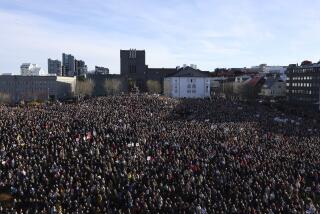From Cod Liver Oil to Hors d’Oeuvres, Iceland Seeks to Be a Good Host
- Share via
REYKJAVIK, Iceland — On the eve of the North Atlantic summit between President Reagan and Soviet leader Mikhail S. Gorbachev, the host government of Iceland is offering every journalist here a ration of cod liver oil, in liquid or capsule form, every morning.
“We encourage you to take it,” said Helgi Agustsson, the spokesman for the government. “You will feel better, stronger and live longer.”
While the offer, made deadpan, has drawn few takers, it reflects, in a delightful way, the exuberance of the Icelandic government as it takes advantage of the days before the impending conference to advertise itself.
In a far more serious vein, Soviet officials have used the preliminary days for a series of news conference setting down the Soviet position on nuclear disarmament and other world issues. These have been somewhat heavy--so heavy, in fact, that Valentin M. Falin, the head of the Novosti press agency, interrupted his own discourse at one session to tell a story.
“Our news conference has been too serious and tense,” Falin said, “so I would like to tell you a joke. Two ducks were flying over water when they suddenly saw a missile zoom by them. ‘I cannot fly as fast as that,’ said the first duck. But the second duck replied, ‘If your tail was burning up like that, you would fly in the same fashion.’ ”
Promotional Efforts
The Americans, on the other hand, have kept a low profile, making no public pronouncements at all, preferring to wait for President Reagan’s Thursday night arrival before taking the Icelandic spotlight.
Iceland is an isolated island of only 240,000 population, and the 2,000 to 3,000 journalists arriving for the conference are an unprecedented target for Icelandic promotion.
Government officials have asked journalists to drop their business cards into a fishbowl. An Icelander, billed as the world’s strongest man, will dip his hand into the bowl each day and pull out the lucky winners of prizes that include pickled salmon, wool sweaters and a two-week trip to Iceland during the summer.
Hors d’oeuvres are being served at the press centers, featuring Icelandic shrimp, chopped herring and lamb. A chef hovers nearby to inquire if the morsels are pleasing and to hand out recipe books.
Leaflet With Story Ideas
Since there will be a news blackout during the meetings, with no briefings by either side until after the last session between Reagan and Gorbachev on Sunday, the Icelandic government is offering journalists a number of excursions to while away their time. The excursions have some enticing names: “Blue lagoon, the taming of the inferno,” is one. “Hveragerdi, the trembling earth,” is another.
The government has even prepared a leaflet with story ideas for idle journalists. Some suggestions: an interview with Halldor Laxness, the Icelandic winner of the Nobel Prize in Literature; an article on Snorri Sturlason, the medieval author of some of Iceland’s famous sagas, and an interview with Holmfridur Karlsdottir, the 22-year-old reigning Miss World.
Iceland is also using the occasion to explain its policies and international grievances to journalists. Minister of Foreign Affairs Matthias A. Mathiessen and Minister of Fisheries Halldor Asgrimsson, for example, met a few American journalists at lunch Thursday to explain some of Iceland’s recent problems with the United States.
A good deal of discussion centered on a dispute over Iceland’s killing of 120 whales this year in a research project. Under pressure from the United States, Iceland has finally agreed to sell no more than 49% of the whale meat from the project to Japan, consuming the rest in Iceland.
At the end of the discussion, which did not seem to excite the interest of the journalists very much, Foreign Minister Mathiessen noted that Fisheries Minister Asgrimsson had not eaten any sandwich. “There is no whale meat here,” explained Asgrimsson with a smile.
Reputation on Line
Aside from the whaling problem, the foreign minister brought up another grievance. Thursday was Leif Ericson Day, which celebrates the discovery of North America by this Viking almost 1,000 years ago. Mathiessen complained that most Americans believed that Ericson was Norwegian.
“Leif Ericson was Icelandic,” said the foreign minister. “In the United States, they call him Norse, whatever that means. But he was born and bred in Iceland.”
Despite all the efforts at promotion and persuasion, Icelandic officials know that much of their future reputation may depend on how smoothly the conference, especially the press operation, is run.
For this reason, there is a good deal of resentment in Reykjavik about news stories complaining that landlords have been gouging journalists who have rented houses and apartments for the summit.
There have been reports, in the often unreliable British press, of payments of more than $1,000 a day. The problem is complicated by the high cost of living in Iceland, which makes it difficult for an outsider to figure out a fair price.
One young woman, who rented her apartment with maid service to four journalists for $2,500 for 10 days, said: “These stories get me angry. Who are these people who are supposed to be charging sums I have never even heard of?”
Much, of course, depends on whether Iceland can cope with the enormous telephone traffic sure to come once the summit begins on Saturday. Agustsson, the government spokesman, said that Iceland has only 200 international lines.
Telephone workers, many digging trenches for cables in the street, have been working unceasingly all week to install 90 more lines. On top of this, Agustsson said, the White House was installing an additional 90 lines for correspondents traveling with Reagan.
By Wednesday night, however, many journalists were reporting difficulty reaching their offices or sending their copy by computer during the peak hours of early evening.
More to Read
Sign up for Essential California
The most important California stories and recommendations in your inbox every morning.
You may occasionally receive promotional content from the Los Angeles Times.













